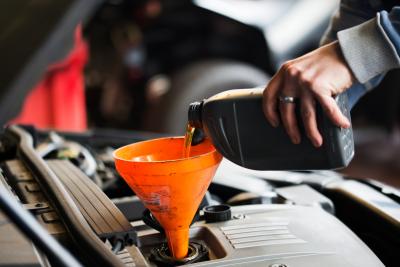Pollution Prevention for Automotive Care
Handling Chemicals & Fluids
When taking care of our vehicles, it’s important to be mindful of the chemicals and fluids we are handling. Most automotive chemicals pose a hazardous risk to our natural environment, especially if they are spilled or leaking. Here are a few tips to be careful with automotive chemicals:
- Do not dispose of automotive, poisonous, or flammable fluids in the trash, on the ground, or down storm drains. Follow the manufacturer’s label for correct clean up and disposal.
- Recycle used oil and other automotive fluids at participating service stations or waste facilities. The Midwest City Household Hazardous Waste Facility accepts automotive chemicals.
- Check your car, boat, motorcycle, and other equipment for leaks. Capture any leaks in a container such as a bucket, tub, or oil pan. Clean up spilled fluids with an absorbent material like kitty litter or Oil-Dri, which can be swept up for proper disposal. Do not hose spills down the driveway, street, or into a nearby storm drain. Make repairs as soon as possible and before the next rain to prevent any fluids from mixing in with stormwater runoff.
Washing
Even a task as simple as washing our cars puts our natural water at risk of receiving pollutants. Here are ways to keep our environment in mind while the suds do their work:
- For the friendliest environmental effect, use a commercial car wash to ensure that dirty, soapy water is going into the sanitary sewer drains.
- If you’d like to wash your car at home, wash your car on a lawn or other unpaved surface to minimize the amount of dirty, soapy water flowing down the street, into the storm drain, and eventually into the creek.
- If you have a storm drain right outside of your house, you can get a liquid barrier, such as a boom or dike, and place it around the inlet to divert the flow of water away from the storm drain.

